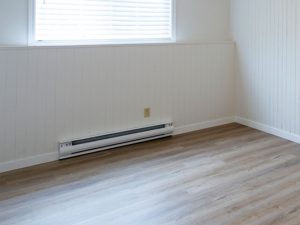If you’re wondering how baseboard heating can benefit your home, this guide is the perfect companion to learn about the advantages and disadvantages of this type of heating system. Read on as we share more information about baseboard heating in this post.
What Is Baseboard Heating?
Baseboard heating systems come in two primary forms: electric and hydronic. Electric systems operate independently without requiring ductwork, making them a straightforward solution. Hydronic systems, though more energy-efficient, circulate hot water via baseboard units using central heating but are not without complexities when it comes to installation.
Efficiency and Installation
When considering efficiency and installation, electric baseboard heaters often have a lower initial cost. They can be a viable heating solution particularly for older homes without existing ductwork. However, in the long run, they may not be the most cost-effective due to their method of operation, which may result in higher energy costs.
Pros of Baseboard Heating
Quiet Operation and Easy Installation
One significant advantage is the system’s quiet operation. Unlike forced-air systems that can be noisy, baseboard heaters work silently, causing minimal disturbance. Additionally, their installation is relatively easy and cost-effective, especially in houses where ductwork for a traditional system would be a huge undertaking.
Targeted Heating and Easy Maintenance
Baseboard heaters excel in providing targeted heating for specific rooms or serving as a supplementary heat source. It can heat only the rooms in use, resulting in potential energy savings. They also boast ease of cleaning and maintenance, often requiring just regular vacuuming to keep them operational.
Longevity
Baseboard heating systems are known for their longevity, with many lasting upwards of 20 years when properly maintained.
Cons of Baseboard Heating
Higher Operating Costs and Space Requirements
The primary concern for many is the high operating cost compared to central heating systems. Their efficiency drops if they are not left at a consistent temperature, meaning that frequent thermostat adjustments can lead to increased energy bills. The space they occupy along walls can also limit furniture placement, affecting your room’s layout and decor.
Maintenance Needs
While they may be easier to maintain than other HVAC systems, baseboard heaters do require regular cleaning. Neglecting this task can lead to reduced efficiency and potential safety hazards.
Safety Considerations
Another point to ponder is the surface temperature of these heaters. They can get quite hot, posing a risk to pets and young children, and they require a safe clearance to prevent fire risks.
Considering Your Options
For those considering replacing their baseboard heating system, it’s crucial to discuss options with an HVAC professional. Whether you’re contemplating an upgrade to a more energy-efficient system or require HVAC repair, it’s practical to seek guidance from reliable companies.
Central heating presents a crucial alternative, offering the convenience of a single system that provides both heating and cooling capabilities. Selecting the ideal heating system for your home involves weighing factors such as lifespan, installation costs, operating costs, and the potential need for additional infrastructure like air ducts and vents.
Whether you need HVAC repair, maintenance, or installation, Cafco Services has you covered! We’re committed to ensuring your home’s comfort all year round. Call us today at (513) 242-3400 or visit our contact page to schedule an appointment.

